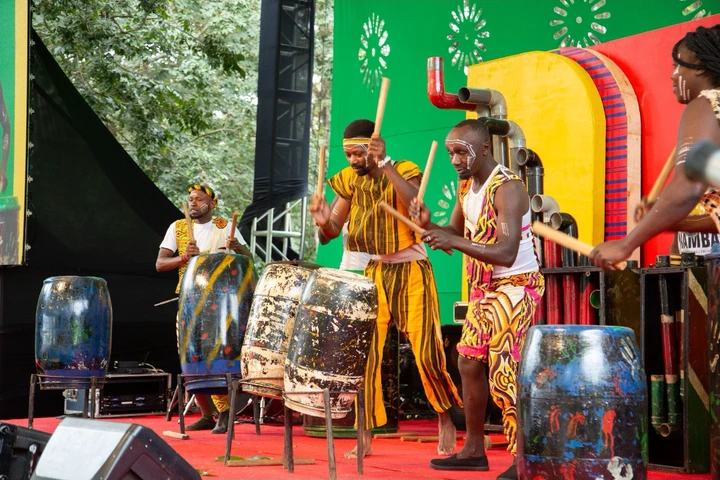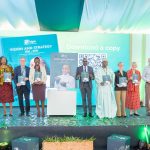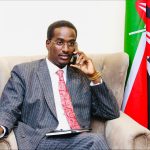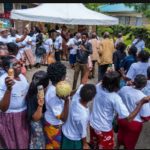Wakati Wetu Festival Unites Africa in a Call for Justice and Healing.
By Peace Muthoka.
Nairobi, Kenya, October 22, 2025. Africa’s first-ever reparations festival, Wakati Wetu: It’s Our Time, opened on Wednesday at the Entim Sidai Wellness Sanctuary in Nairobi, drawing artists, activists, scholars, and policymakers from across the continent. The two-day event themed “It’s Our Time: To Resist, Repair and Reclaim” seeks to confront the painful legacies of colonialism while inspiring a renewed sense of African pride, memory, and justice.
Convened by African Futures Lab, Baraza Media Lab, AU ECOSOCC, and Reform Initiatives, the festival blends art, activism, and intellectual dialogue into what organizers describe as “a space of remembrance, resistance, and rebirth.”
From the opening moments, emotion filled the air as award-winning author Yvonne Adhiambo Owuor delivered a stirring keynote that left the audience in reflective silence. “Reparations is first an act of moral autopsy and then moral exorcism,” she said. “There is no healing without walking into, around, and naming the wound in its fullness.”
Owuor’s words struck a chord with many who have long felt that the scars of colonization are yet to fade. “Repair begins with the truth,” she continued. “To strip away illusions so that what is being healed is the wound itself.”
Adding a personal touch, Dr. Kathryn Nwajiaku-Dahou, Director of the Politics and Governance Programme, shared a proverb from her father: “The cup that was meant for your lips will never pass you by.” Her message, steeped in hope, echoed the festival’s spirit that Africa’s time for justice and restoration has come.
Veteran lawyer and former MP Paul Muite, who played a key role in the Mau Mau reparations case against Britain, reminded participants that justice begins with truth. “For reparations cases to succeed, we must start with research, accurate records of who was who, who did what,” he said. He reflected on the struggles of Kenya’s freedom fighters, saying, “The Mau Mau war broke out because their efforts to get back their land failed. Britain responded with torture, killings, and detentions. Even after independence, betrayal came again from leaders who did not want to hear about Mau Mau.”
In a session titled “Ubuntu: Media and Memory,” journalist Ngartia Mūrūthi explored how colonial newspapers helped legitimize oppression. “For the colonial project to succeed, it had to manufacture consent,” he said. “Newspapers were the biggest tools of propaganda. Kenya was advertised as a white man’s country.”
Media scholar Christine Mungai added that rewriting such narratives demands courage. “For a journalist, it takes bravery to go against the grain and tell stories that make power uncomfortable. That courage is part of repair.”
Philosopher Yoporeka Somet reminded the gathering that “you cannot talk about renaissance if you do not know your history,” while Dr. Natasha Shivji urged African states to own the reparation agenda. “The language of reparations is not just a demand on the outside world; it’s a demand on the state to organize its people and history into a revolutionary platform.”
Art took center stage in the evening as musicians Eric Wainaina, DJ Talie, and Koko Koseso performed under the theme “Confronting the Silence.” Poets and visual artists turned the venue’s walls into vibrant expressions of memory and resistance. Films such as “If Objects Could Speak” and “How to Build a Library” explored the loss of stolen African artifacts and erased histories.
Festival convener Liliane Umubyeyi, Executive Director of African Futures Lab, said the gathering was about reclaiming Africa’s power to define its destiny. “We are here because justice is both a political and cultural question,” she said. “Our shared creation has the power to renew our understanding of our place in history. The time is truly ours, Ni Wakati Wetu!”
The festival continues through Thursday, October 23, featuring sessions on Tax Justice, Climate Reparations, and Gendered Reparations, and will close with performances by Sitawa Namwalie and June Gachui.
As the African Union prepares to usher in the Decade of Reparations (2026–2036), the Wakati Wetu Festival marks a defining moment, one where Africa stops pleading for justice and begins powerfully shaping it.









